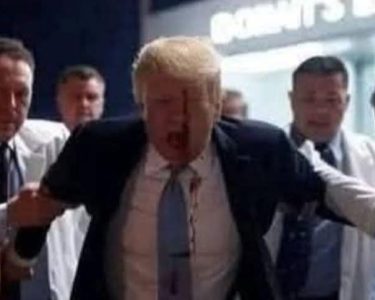(CNN) President Donald Trump is on his way out of the White House, but he’s not done just yet. After nearly four years of relentless law-bending and norm-smashing, Trump now enters his final two-plus months in office entirely unrestrained. He won’t have to face the voters again, so he can indulge his basest instincts for payback and self-preservation. Get ready for a Constitutional stress test like we’ve never seen before.
Here are three main areas where Trump could still wreak havoc with the law before he leaves office:
Pardons. It won’t be anything new for Trump to issue a rash of pardons in his final weeks in office, right up to his very last day. Prior presidents commonly have issued pardons during their final days in office, including some historically dubious ones. On his final day as president, for example, President Bill Clinton pardoned his own half-brother Roger Clinton and the fugitive billionaire financier Marc Rich (which prompted a federal criminal investigation, but ultimately no charges).
Who might Trump pardon? Michael Flynn could be first in line. Flynn continues to fight in federal court (joined by William Barr’s Justice Department) to have his case thrown out. Flynn’s attorney reportedly briefed Trump on the case directly — underscoring just how politically charged it has become — and asked Trump not to issue a pardon, apparently hoping to win in the courts first. However, with Trump on his way out, Flynn may want to rethink that strategy. Should the federal judge on Flynn’s case reject Flynn’s effort to dismiss, it would leave him exposed to potential jail time. A Trump pardon is Flynn’s only sure protection.
Trump also might pardon others who were convicted by Robert Mueller’s team, including Paul Manafort and George Papadopoulos. Both have already served their time, but Trump might seek to symbolically undermine Mueller’s work by pardoning them.
Trump could also preemptively pardon his family members and others at the Trump Organization. New York state-level prosecutors are reportedly investigating the Trump Organization for various potential frauds, but a presidential pardon only covers federal crimes, not state offenses. Nonetheless, Trump might issue federal pardons to his family members just in case a future Justice Department determines federal charges are appropriate — investigations that begin at the state level do at times wind up being charged by federal prosecutors.
The biggest question: will Trump try to pardon himself? We don’t know conclusively whether a presidential self-pardon is lawful — primarily because nobody has ever tried it before. The Constitution places no explicit limitation on the pardon power and legal scholars differ on the issue. (My own view is that the drafters of the Constitution abhorred self-dealing and did not intend to permit a presidential self-pardon.) If Trump does pardon himself, federal courts could eventually give us a definitive answer.
While most administration officials will follow Trump out the door, some stand to outlast him. FBI Director Chris Wray is likely first on Trump’s hit list. Trump nominated Wray as FBI Director — a position that carries a ten-year term, under federal law — and the Senate confirmed him in August 2017. Trump could cut that short, however, if he fires Wray on his way out of the White House. Trump has publicly criticized Wray, who has undermined Trump’s false political narratives about widespread election fraud and the danger posed by Antifa. Note that if Trump does fire Wray, President-elect Joe Biden could choose to re-nominate him when he takes office in January 2021.
Trump also might try to take down inspectors general, the internal watchdogs within each federal agency. While every president has the ability to nominate and remove IGs, many who were appointed by prior presidents remain in place. Trump has shown no hesitation about firing those who have not supported his political agenda, including former Intelligence Community IG Michael Atkinson — whom Trump himself had appointed — as retribution for Atkinson’s disclosure of information that led to Trump’s impeachment.
Trump’s most likely target could be Justice Department IG Michael Horowitz, who was appointed by Obama in 2012. Horowitz issued a report in 2019 that concluded that, while the FBI made many errors relating to the opening of the Russia investigation, the investigation was justified and the evidence did not establish that FBI officials acted based on political motives.
Executive Orders. Throughout his term in office, Trump has tried to enact his policy and political agendas through Executive Orders. At times he has succeeded (the Supreme Court ultimately upheld his foreign travel ban, after the administration revised it multiple times) and at others he has failed (the Supreme Court rejected Trump’s effort to dismantle the Deferred Action for Childhood Arrivals program). Trump might well try again to dismantle DACA on his way out of office — the Supreme Court left the door open for the administration to issue a new order, utilizing proper administrative procedures — or to enact other policy goals relating to the Affordable Care Act, environmental protection or immigration policy. Biden could try to rescind any such measures upon taking office but, as the DACA ruling showed, it’s not a given that one administration can automatically reverse the executive actions taken by another.
Trump has played by his own rules throughout his time in the White House. Now he’s got nothing left to lose. If you think Trump’s disregard for rule of law over the past 46 months has been alarming, just wait for what could be in store between now and January 20.




